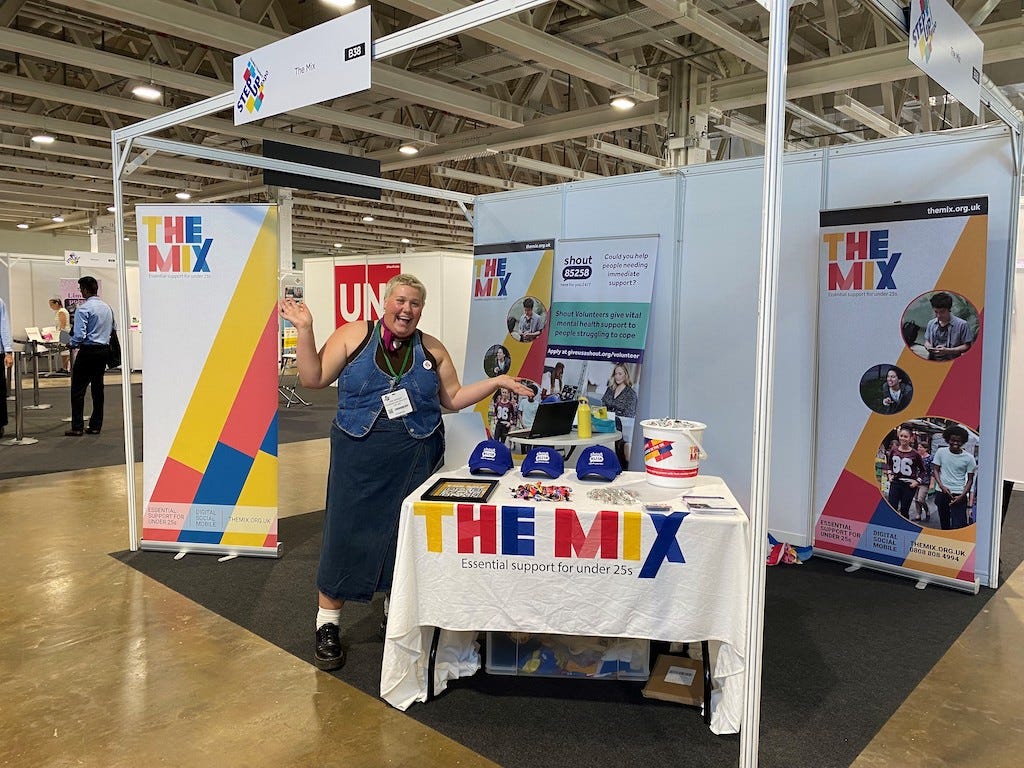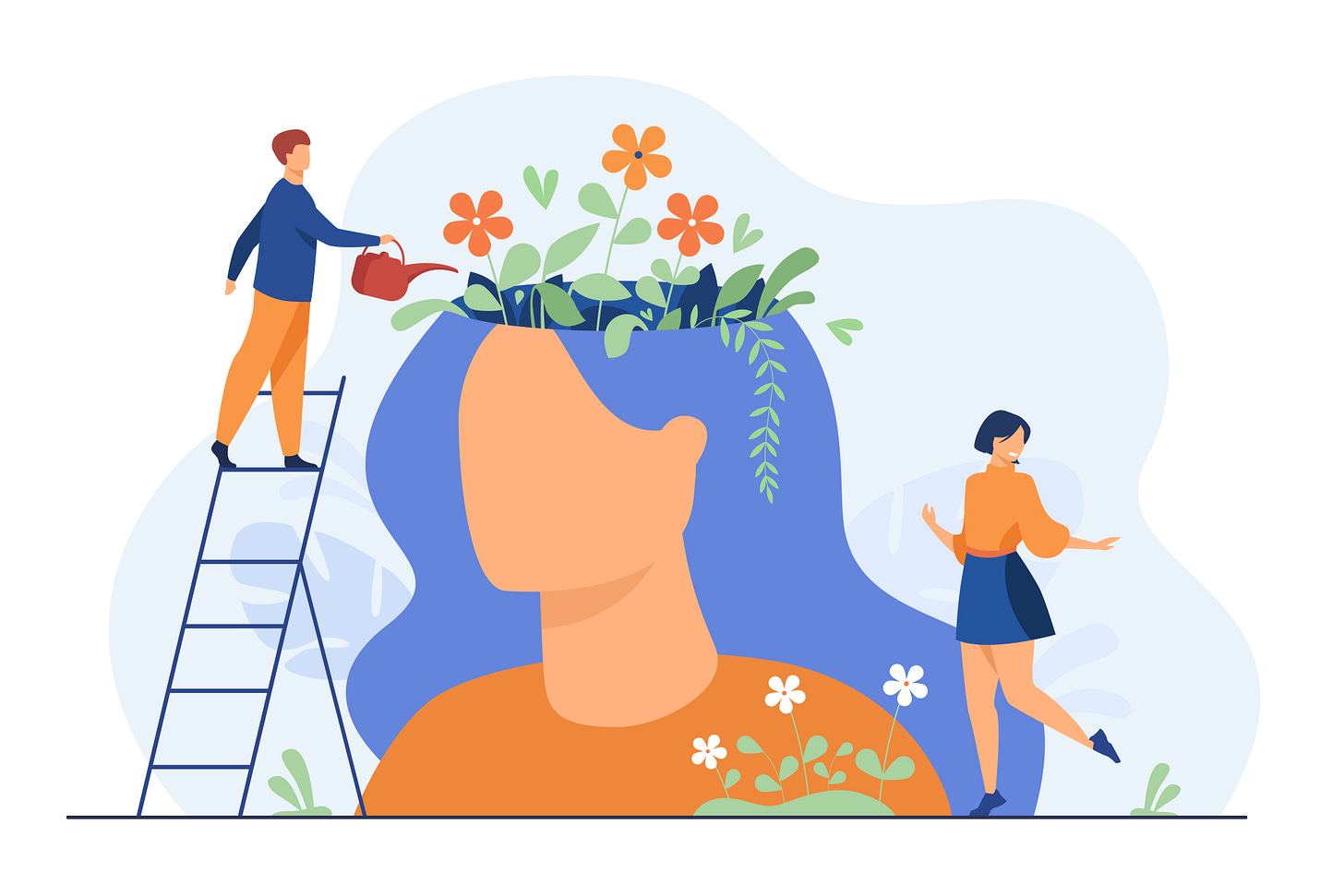The State of Stoke's Mental Health – and How to Get Help if You Need it
Post-covid, there's been a marked increase in anxiety levels in the city – but there's a wealth of groups out there offering valuable support for those who are struggling…
As a country, we are in a mental health crisis: one in four of us living in England will face a mental health problem at some point every year and one in five children and young people in England are battling mental health issues according to MIND’s Big Mental Health Report for 2024. Even Stoke’s most famous son, wasn’t immune: in his documentary, Robbie Williams opened up about his struggle with depression, anxiety and PTSD among other issues, all of which left him feeling lonely and isolated.
In his 2024 report, Stoke-on-Trent’s Director of Public Health, Stephen Gunther, stressed that, “Mental wellbeing is more than just the absence of mental illness; it involves a state of balance, resilience, and the ability to navigate life's challenges.”
Improving wellbeing is a priority as the city begins a journey to boost prosperity across all communities through investment and regeneration initiatives. Feeling low? The council’s list of mental health support services is a good place to start.
In the following article, we highlight just a few initiatives that are encouraging local people take positive steps towards better mental health.

A Valuable Lifeline – But So Much More
For many struggling with their mental health, The Samaritans can quite literally be a lifeline. Established in 1962, Samaritans’ Stoke on Trent & Newcastle telephone service (116 123) remains popular, but these days it also provides support via email, online chat and letter plus tailored programmes for people in schools, prison, veterans and those bereaved by suicide. “A common misconception is that you have to be suicidal to contact us – but we provide free, non-judgmental emotional support to anyone who needs it,” says branch director Joe Potts.
There are a range of programmes in the local community that help spread awareness and ensure fewer people die by suicide including pop-up outreach events at Trentham Gardens and Stoke Pride. Stoke’s high levels of health inequality and social deprivation can both impact someone’s mental health and risk of suicide, he observes, with people among the most deprived 10 per cent of society more than twice as likely to die from suicide than the least deprived. This is why reminding residents that help is out there is crucial, he adds.
“We regularly go into colleges and Keele and the University of Staffordshire and we also have volunteers who go into HMP Dovegate to train people in prison to become Listeners, who are there for others inside the facility who may be struggling.”
The Samaritans’ SHUSH tips are an easy guide to help anyone be there for someone they’re worried about, he concludes: Show you care; Have patience; Use open questions; Say it back and Have courage.

Increased Demand from Men and Children
North Staffs MIND’s chief executive, Kate Boundy, says it’s seen an uptick in the number of children of primary school age presenting with worries and anxiety. “We’re also seeing increased demand for our men’s mental health offerings. We now have two men only groups and offer talking therapy alongside physical activity. This is run by one of our male therapists who’s also a qualified personal trainer.”
Like Potts, Boundy agrees that money problems can affect our mental health and the relationship between poverty and mental health is cyclical. The research bears this out, as last year The Samaritans reported its third consecutive year of rising calls from those with money worries. “Financial hardship can worsen mental health problems, and poor mental health can make it harder to escape poverty creating a vicious cycle. There are lots of amazing services across Stoke from the statutory and third sector, but attracting sustainable funding remains a constant challenge,” she admits.
What if our own mental health is fine but we want to support someone who else? “Take notice and don't be afraid to ask how someone is doing, and give them some time where you really listen. Often, people don't want or need advice or fixes, just to feel heard and noticed so they feel less alone. There’s lots of info and signposting to other services on our website but ultimately, kindness goes a long way.”

Finding your Passion on the Ten Step Programme
Stoke-based non profit Walk Talk Action helps people struggling with their mental health through “walking, talking and taking action towards achieving their goals one step at a time,” says founder and CEO Teri Elder, a former soldier who battled with postnatal depression following the birth of her first child. Who do they help? “Our criteria is PTSD, anxiety and depression, isolation and loneliness, midlife crisis and/or are a veteran/ cadet or serving personnel, but we’re not limited to this.”
WTA offers regular walks for members at locations including Longton Park and a weekly Tea and Toast session at Meir Heath’s St. Francis church. Users of the service can expect, “Friendship, inclusion, and an overall feeling of being part of something. You become valued and missed when you’re not there. Our walks help those who may not like to be out of their own to build relationships, meet new people, and explore new places,” Elder says. The Tea and Toast sessions, meanwhile, have welcomed more than 1,000 people since debuting last April. “We invite guest speakers in to help introduce new opportunities and signposting within the area,” she adds.
The heart of WTA is its ten step programme. “This helps find a person's purpose and achieve their goals. It’s about working out who they are and finding their true passion in life. We’ve helped people to overcome a fear, get back into education or employment and simply make friends and reduce those feelings of isolation and loneliness. It’s all about proving life can be better if you’re willing to make a change.”
Elder feels there are a lot of community groups and charity organisations in Stoke that want to help, but not everyone may be aware of them. story. “Having struggling with my own mental health, I have a passion for signposting people to the places they need as we’re all in this together.”

Support for Ex-Mining Communities
The only national charity dedicated to supporting former coalmining communities, Coalfields Regeneration Trust (CRT) has three core programme offers in England, one of which is CRT Engage in Meir, where clients work with health & wellbeing coaches, a nutritionist and an employment and skills coach, says regional development manager Richard Stevens. Services offered include support for anxiety management, befriending and wellbeing walks. There’s also activities including arts & crafts and yoga plus opportunities to build on life skills and study for qualifications, he adds.
“The level of support provided is determined by the needs of the individual and person-centred action plans are devised to help members achieve their goals. As our service is not time limited, progress can take several months in many cases as small incremental steps are required,” says Stevens. A good example of CRT’s success is Kat’s story. “Over a period of many months Kat received support from one of our health & wellbeing coaches, who helped her to overcome depression. Then our employment & skills coach, sourced training opportunities and helped Kat to secure her dream job as a Teaching Assistant in a special school.”
Giving local people a voice is a key focus for its new community connector role, says Stevens, who adds that the CRT Engage team is planning to have a dedicated office space in Meir Community Education Centre. “This underutilised community asset unlocks so many more opportunities for local people while increasing footfall to existing provision such as the library service. We’re already drawing up plans with one of our national partners, The Workers Education Association (WEA), one of the UK’s largest adult learning providers. They will soon commence on site delivery with a view to increasing the free group activities on offer in Meir to support health and wellbeing in addition to providing education and employment pathways.”

Reaching Out to Young People and the LGBTQ+ Community
While not specifically a service for residents of Stoke-on-Trent and Staffordshire, mental health charity The Mix offers free counselling sessions to anyone under 25, a community where young people can connect with each other and more than 2,000 articles covering topics including protecting your mental health online, anxiety, OCD and phobia support and self-care practices.
Young people seek out The Mix to talk about big issues like money, sex and relationships alongside drugs and alcohol, says senior content and communications manager Tim Pinks. “Issues of loneliness are increasing among this demographic, and bullying is a constant concern,” he adds. Around 65 per cent of its users identify as female and a growing number identify as non-binary or gender diverse. More than 20 per cent of users identify as LGBTQ+.
The charity’s recent impact report made for positive reading, with four million young people more likely to seek support thanks to its social media content. More than one million felt more able to cope with life’s challenges thanks to its website content, while more than 122,000 found relevant resources from its discussion boards, says Pinks.
While we have a long way to go before we fully address Stoke’s mental health challenges, groups like Walk Talk Action and Coalfields Regeneration Trust along with local branches of MIND and The Samaritans are making small but significant steps towards better wellbeing for all of us living in the city.
If you’ve battled with mental health issues for some time, it can feel hopeless. But it’s never too late for things to change. As Robbie recently told reporters on the red carpet at the premiere of Better Man, “it took me nearly a couple of decades to fight through [my mental health issues]. Now I’m at the other end, and it’s beautiful.”
TEN OTHER PLACES WHERE YOU CAN GET HELP…
1. Andy’s Man Club (weekly support groups for men)
2. Changes Health & Wellbeing (wellbeing & recovery services, support groups)
3. ASIST
4. The Dove Service (bereavement counselling and support)
5. Mother’s Mind Staffordshire (maternal mental health issues)
6. Sutherland Centre (adult community mental health team)
7. North Staffs Carers (emotional support for unpaid carers)
8. Savana (counselling and support for survivors of domestic violence)
9. The Community Drug and Alcohol Service (support for addiction)
10. North Staffs Combined Healthcare (helpine to call if in a mental health crisis)
Join the conversation and let us know about your experiences of mental health struggles in Stoke-on-Trent in the comments section below





Hi we offer support and access to affordable food and inclusive activities for all ages at the u7 arts and cultural centre SUTHERLAND Road Longton ST3 1HT 07761 516609 fully qualified in mental health support and experts in applied arts
We offer free wellbeing workshops at North Staffordshire Wellbeing College, all have been coproduced and are facilitated with people with lived experience of the subject, topics cover things like anxiety, psychosis, bipolar as well as looking for volunteering and employment when you have mental health problems, and many more!